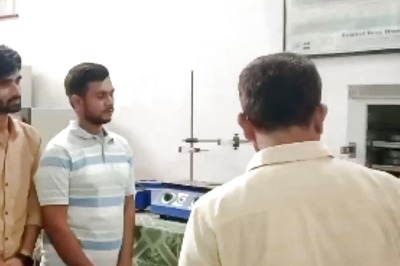
views
Finding Help

Decide if a blind trust is right for you. There are many different kinds of trusts, and you shouldn’t create a blind trust unless you are confident this is the type of trust you want. People generally create blind trusts for the following reasons: You are a politician. Because the trust is blind, the politician doesn’t know what their money has been invested in. A blind trust is a good way to avoid conflicts of interest. You have other conflicts of interest. A blind trust works as well for non-politicians as it does for politicians. You win the lottery. You can create a blind trust to help shield your identity as the beneficiary of the trust.

Identify your assets. The trust holds assets. Before contacting a lawyer to set up the blind trust, you should identify what property you want to put in it. Blind trusts are often created for particular assets, such as lottery winnings or ownership in businesses that could create a conflict of interest. If you want to put other assets in a trust—such as your home or cash—then you can talk with your lawyer about creating different kinds of trusts for those assets.

Find a lawyer. You definitely need a lawyer to help you draft a blind trust. Although you can draft simple trusts yourself, a blind trust is sufficiently complicated that you need professional help. You can get a referral for a California Trusts and Estates attorney in the following ways: Ask someone who has created a blind trust if they would recommend their lawyer. For example, if you are a politician, then ask other politicians which lawyer they use. Use a referral service. You can find referral services in your county by calling 866-442-2529 if you are in the state. Call 415-538-2250 if you are outside California. Ask for a lawyer who specializes in estate planning by calling 415-538-2120. Look in the Yellow Pages for a trusts attorney. Contact your prepaid legal services plan. Your employer, union, or credit union might offer legal insurance plans. They can often give you the name of an attorney.

Hire the lawyer. Make sure that you get and sign an engagement letter or fee agreement. Read it closely and make sure that you understand what work the lawyer will do for you and the costs.

Meet with an accountant. You need to understand the tax consequences of creating a blind trust. You should consult with an accountant or other tax professional so that you understand how your taxes will be affected. If you don’t have an accountant, you can ask the lawyer to recommend one. You can also find an accountant by looking in your phone book. Alternately, you can visit the website for the California Society of Certified Public Accountants and click on “Find a CPA.”
Creating the Blind Trust with Your Lawyer

Discuss your investment objectives. In a blind trust, you don’t control how the assets will be invested. In fact, you won’t have any idea where or how they are invested. However, you can decide when creating the trust what your investment objective will be. The trustee, who manages the assets, will then have to follow that objective. For example, you might decide to invest aggressively. Alternately, you might focus investment on preserving the amount of capital in the trust. You can also decide asset allocation, such as the amount you want to put in equities or bonds.

Determine whether to create an irrevocable trust. A trust can be either “revocable” or “irrevocable.” When a trust is revocable, you can terminate it during your lifetime. You generally can’t terminate an irrevocable trust. Discuss the differences with your attorney. California law might not allow you to create a revocable blind trust.

Name beneficiaries. You probably will name yourself and your family as the beneficiaries. You should discuss with your lawyer who you want to get the property in the trust in case of your death. If a group of people purchased a lottery ticket, then each person can be named a beneficiary. However, they all need to agree to the trust.

Figure out how much the beneficiary should receive. You also should decide how much money you want to receive and the schedule for disbursements. For example, if you win the lottery, you might want $10,000 deposited each month, or a different amount. You might need to pull in your accountant here to estimate how much you can take out each installment period without depleting the trust of money.

Choose a trustee. Finding and hiring a solid trustee is critical. This person will manage your assets without any oversight from you. You and your lawyer should discuss who would be a good trustee. Often, you can hire a financial institution or the lawyer to act as your trustee. The trustee can’t be someone too close to you. For example, a trusted financial advisor who handles your other investments probably can’t serve as the trustee for a blind trust. You also can’t choose someone you know personally, such as a family member or friend. Financial institutions and lawyers will charge a fee to act as trustee. You should consider the costs when making your selection.

Sign the trust document. Your lawyer will draft the trust document, which you will need to sign. Make sure to read the document closely before signing. Check that it contains all of the information that you and your lawyer discussed. If you are unsure of anything, then call up your lawyer and talk about it. You shouldn’t sign the document until you agree and understand everything in it.
Transferring Assets to the Trust

Give your lawyer your lottery ticket. If you are creating a blind trust because you won the lottery, you can give your lawyer the ticket to redeem. Your lawyer can then deposit the lottery earnings into the trust. Your lawyer will draft a document that states you are donating your lottery ticket to the trust. You must sign this document.

Re-title assets in the trust’s name. Assets must be owned by the trust. Accordingly, the title must be changed to any property that has a title, such as real estate or stock certificates. Your lawyer can re-title the assets for you into the trust’s name. Keep copies of all deeds of transfer for your records, in case any dispute arises in the future about whether assets were properly transferred to the trust.

Assign other property to the trust. You can also transfer property to the trust that doesn’t have a title. Your lawyer will draft a document, assigning the property to the trust. Keep copies of these assignment documents for your records. Store them in the same place as any deed transfers and your copy of the trust document.




















Comments
0 comment